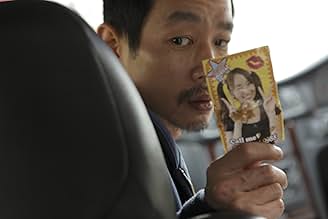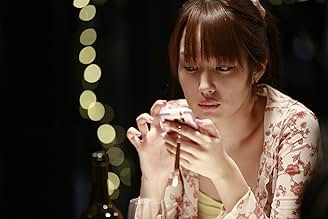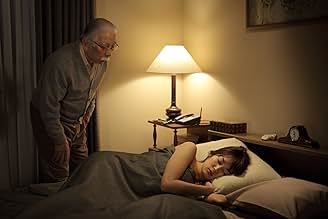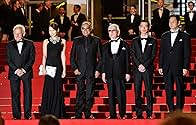NOTE IMDb
7,0/10
14 k
MA NOTE
À Tokyo, une jeune travailleuse du sexe développe une relation inattendue avec un veuf pendant deux jours.À Tokyo, une jeune travailleuse du sexe développe une relation inattendue avec un veuf pendant deux jours.À Tokyo, une jeune travailleuse du sexe développe une relation inattendue avec un veuf pendant deux jours.
- Réalisation
- Scénario
- Casting principal
- Récompenses
- 1 victoire et 6 nominations au total
Kôichi Ôhori
- Taxi Driver
- (as Kouichi Ohori)
Ryota Nakanishi
- Student
- (non crédité)
Avis à la une
This could have been a great film since all the necessary elements are already there. The viewers can feel that they are in expert hands but unfortunately, director Abbas Kiarostami's need to make the viewer appreciate his genius does not work in the film's favor. Take the first scene for instance. I was very annoyed that the camera work made me feel a dissonance between what I saw & what I heard. Perhaps in his clever way, the director was trying to hint that nothing is as it seems. I don't know what his intentions were but I didn't care for his tricks.
Anyway, moving on with the story, we surmise that the young & beautiful Akiko has a possessive & jealous boyfriend & is being forced by her boss/pimp into an difficult position that she's unable to get out of. The scene with her cab circling around her waiting grandma under the statue is so beautifully done that instantly my ambiguity towards Akiko vanished & I wanted this unhappy young woman to somehow find a way out of her predicament. The client is an old & retired academic who wanted to spend some time with Akiko. It is hinted that she bears a resemblance to his own granddaughter. She's however too exhausted to eat or talk, & goes straight to sleep. The old man lets her rest & in the morning drives her to the College so that she can appear for her exam. There he meets her fiance, Noriaki, who tries to come across as a decent young man. He mistakes the old man for Akiko's grandpa. Noriaki feels that he's in love with her but the wise old man can sense that all's not well between the young lovers & says that they are both too young to marry. Noriaki is nice enough to the old man but the latter can see that Noriaki is uncouth, has no interest in education & is chauvinistic to the point that he feels that once he marries Akiko, she would have to give in to all his demands. He has a low self esteem, is irrational, desperate, delusional, & obviously not the brightest bulb in the bunch. His fiancee has been avoiding him & he has his suspicions regarding Akiko's work but is unwilling to see the facts. However, when he is faced with the truth, he reacts in a very volatile manner. The viewer along with Akiko & 'grandpa' feel frustrated that more than anything else, her unfortunate liaison with this seemingly harmless but actually deranged & aggressive man may doom her life forever.
Anyway, moving on with the story, we surmise that the young & beautiful Akiko has a possessive & jealous boyfriend & is being forced by her boss/pimp into an difficult position that she's unable to get out of. The scene with her cab circling around her waiting grandma under the statue is so beautifully done that instantly my ambiguity towards Akiko vanished & I wanted this unhappy young woman to somehow find a way out of her predicament. The client is an old & retired academic who wanted to spend some time with Akiko. It is hinted that she bears a resemblance to his own granddaughter. She's however too exhausted to eat or talk, & goes straight to sleep. The old man lets her rest & in the morning drives her to the College so that she can appear for her exam. There he meets her fiance, Noriaki, who tries to come across as a decent young man. He mistakes the old man for Akiko's grandpa. Noriaki feels that he's in love with her but the wise old man can sense that all's not well between the young lovers & says that they are both too young to marry. Noriaki is nice enough to the old man but the latter can see that Noriaki is uncouth, has no interest in education & is chauvinistic to the point that he feels that once he marries Akiko, she would have to give in to all his demands. He has a low self esteem, is irrational, desperate, delusional, & obviously not the brightest bulb in the bunch. His fiancee has been avoiding him & he has his suspicions regarding Akiko's work but is unwilling to see the facts. However, when he is faced with the truth, he reacts in a very volatile manner. The viewer along with Akiko & 'grandpa' feel frustrated that more than anything else, her unfortunate liaison with this seemingly harmless but actually deranged & aggressive man may doom her life forever.
"Like Someone in Love" is Abbas Kiarostami's follow-up to the mind- bending relationship drama "Certified Copy". Dissection of the title alone provides so many interesting clues and directions for the film to take in addition to what was analyzed previously. And while it does in fact address those interesting ideas (indirectly), it is as minimal as any film-going audience could possibly stand. We essentially watch an unexplained relationship unfold in almost real-time (just under 24 hours).
Akiko (Rin Takashi) is a college-aged girl up to something in the big city of Tokyo that is probably not good for her. She's having an argument with her boyfriend on the phone and she's saying no to a job that a middle-aged man is offering her. This middle-aged man is clearly her pimp and "no" means "yes, sir, I will do whatever you tell me to." So into the cab Akiko goes and we begin to worry about her safety. We spent an awful long time worrying about her safety with no idea what lies ahead for her. The cab ride was two hours long and we saw a lot of it. Akiko arrives at the apartment of an older gentleman looking for companionship. We don't really know what exactly Takashi Watanabe (Tadashi Okuno) wanted with Akiko, and then in the morning he drives her back to Tokyo. Another long car ride.
Visually the car rides were impeccably shot. The scenery was reflected in the windshield and we could still see the characters' faces behind. Unfortunately we don't really know what's happening with these characters during these long car rides. Sometimes a car ride is just a car ride.
Eventually we meet Noriaki (Ryo Kase), Akiko's offensive boyfriend. And he starts putting the relationships into perspective. A different perspective. He allows Akiko and Watanabe to act differently than they actually are, which allows us to start seeing them as they actually are. And then it ends. Well, not quite that quickly, but without giving anything away, it ends.
We're given so little on screen to examine that it can be frustrating even to the viewers that appreciate the subtle beauty in film. Two weeks after first seeing it, my mind has started to form a few opinions on what was being said but it's still a bit too little, too late.
Akiko (Rin Takashi) is a college-aged girl up to something in the big city of Tokyo that is probably not good for her. She's having an argument with her boyfriend on the phone and she's saying no to a job that a middle-aged man is offering her. This middle-aged man is clearly her pimp and "no" means "yes, sir, I will do whatever you tell me to." So into the cab Akiko goes and we begin to worry about her safety. We spent an awful long time worrying about her safety with no idea what lies ahead for her. The cab ride was two hours long and we saw a lot of it. Akiko arrives at the apartment of an older gentleman looking for companionship. We don't really know what exactly Takashi Watanabe (Tadashi Okuno) wanted with Akiko, and then in the morning he drives her back to Tokyo. Another long car ride.
Visually the car rides were impeccably shot. The scenery was reflected in the windshield and we could still see the characters' faces behind. Unfortunately we don't really know what's happening with these characters during these long car rides. Sometimes a car ride is just a car ride.
Eventually we meet Noriaki (Ryo Kase), Akiko's offensive boyfriend. And he starts putting the relationships into perspective. A different perspective. He allows Akiko and Watanabe to act differently than they actually are, which allows us to start seeing them as they actually are. And then it ends. Well, not quite that quickly, but without giving anything away, it ends.
We're given so little on screen to examine that it can be frustrating even to the viewers that appreciate the subtle beauty in film. Two weeks after first seeing it, my mind has started to form a few opinions on what was being said but it's still a bit too little, too late.
A vignette of some pretty sad people whose lives intersect in awkward ways over the course of a day. There's an escort/prostitute (Rin Takanashi), who isn't able to see the grandmother who's made a special trip to Tokyo to meet her, because she's going off to meet a client old enough to be her grandfather (Tadashi Okuno). He's a widower who used to teach, and struggles to get her to do the things he planned - drink some wine, eat the food he prepared, and talk - as instead she just wants to go to sleep. Then there's her troubled boyfriend (Ryo Kase), a guy who's in love with her but senses her distance and suspects she's up to something, heightening his jealousy and clinginess. He actually meets the older man the following day and assumes he's her grandfather, resulting in a strained conversation where he gets some advice. Even the nosy neighbor (Mihiko Suzuki) tells of how her love was unrequited and she's now cooped up, caring for her disabled brother.
They're all a bit broken, each in their own way, and yet Kiarostami allows each to engage in thoughtful dialogue that shows their humanity, and that they're not simply objects of pity. It's in those moments that I liked the film the most. I have to say, though, that its quiet style lagged a bit as it played out, and the ending was rather abrupt and unresolved. The quality of the filmmaking was high, and I could really feel myself on the streets of Tokyo at night and in the heads of these people, but the story wasn't particularly compelling to me, so I was left feeling it was a near miss.
They're all a bit broken, each in their own way, and yet Kiarostami allows each to engage in thoughtful dialogue that shows their humanity, and that they're not simply objects of pity. It's in those moments that I liked the film the most. I have to say, though, that its quiet style lagged a bit as it played out, and the ending was rather abrupt and unresolved. The quality of the filmmaking was high, and I could really feel myself on the streets of Tokyo at night and in the heads of these people, but the story wasn't particularly compelling to me, so I was left feeling it was a near miss.
In Tokyo, a young prostitute (Rin Takanashi) develops an unexpected connection with a widower (Tadashi Okuno) over a period of two days.
At this point in his career, Abbas Kiarostami had been directing films for forty years, so he is no amateur. But it might be a bit of a new beginning, filming in Tokyo with an all-Japanese cast. In fact, had one not known better, they might assume the director was Japanese. What do these two worldviews create when blended?
Professor Nico Baumbach makes much of this cultural difference (and rightfully so), saying Kiarostami's foreign immersion "heightens in a new way the sense of the filmmaker as spectator", but is then quick to point out that despite this, we are not alienated from our subjects. The experience of distance "becomes the condition for an emotional connection that otherwise would not have been possible."
The film is also, in short, beautifully shot, with glorious cinematography. This is the sort of film, with its style and charismatic lead actress that one could watch for hours regardless of plot or substance. Critic David Denby says it more eloquently when he writes, "The cinematography is clear and hard-focused, and the editing produces long, flowing passages. This exquisitely made, elusive film has a lulling rhythm and a melancholy charm."
At this point in his career, Abbas Kiarostami had been directing films for forty years, so he is no amateur. But it might be a bit of a new beginning, filming in Tokyo with an all-Japanese cast. In fact, had one not known better, they might assume the director was Japanese. What do these two worldviews create when blended?
Professor Nico Baumbach makes much of this cultural difference (and rightfully so), saying Kiarostami's foreign immersion "heightens in a new way the sense of the filmmaker as spectator", but is then quick to point out that despite this, we are not alienated from our subjects. The experience of distance "becomes the condition for an emotional connection that otherwise would not have been possible."
The film is also, in short, beautifully shot, with glorious cinematography. This is the sort of film, with its style and charismatic lead actress that one could watch for hours regardless of plot or substance. Critic David Denby says it more eloquently when he writes, "The cinematography is clear and hard-focused, and the editing produces long, flowing passages. This exquisitely made, elusive film has a lulling rhythm and a melancholy charm."
10mkian
I watched this movie on silver screen twice up to now and I'm sure I can check it out ten more times and still enjoy it. It's definitely a minimal piece of art but it's as deep as life. It looks simple but it doesn't mean you can't elaborate. Kiarostami highlights lifelike stories. Stories which belong to us, ordinary people! Aren't they important? And Kiarostami doesn't conceal this fact that he likes Haiku and Japanese culture but he doesn't have any idea how this feelings came up to him. He started writing poems that resembled Haiku when he was just 20! The serene, nonchalant, and often profoundly philosophical language of haiku allows the poet to swiftly touch on the core of the universal human condition: love, despair, humor, death; as his movies do and now Kiarostami made his last movie (and one of the best ones) where Haiku was blossomed: Japan. All these said, I can't ignore the innovative cinematographic techniques he used in "Like Someone in Love" that adds to the beauty of this movie. Remember the first scene in the bar with Camera fixed on a table, the girl is talking in behind while we see other people activities. We don't know what we should track. The other scenes in the car which camera plays with lights and shadows are just magnificent. I'm really amazed how delicately he sets up these all. Every detail is deliberated. Briefly, if you are bored of the stupid stories we see in the movies nowadays and instead want to know what's behind go and check this out.
Le saviez-vous
- AnecdotesIn the late 1990s Abbas Kiarostami was driving late at night while on a visit to Tokyo and witnessed a young girl on the side of the street dressed as a bride. In the years following, while visiting Tokyo to promote other films, he realized that he was always looking for that same girl because she had left such an impression but that he would never likely notice her again in real life because she wouldn't be wearing the same dress. This experience became the basis for the film.
- ConnexionsFeatured in At the Movies: Cannes Film Festival 2012 (2012)
Meilleurs choix
Connectez-vous pour évaluer et suivre la liste de favoris afin de recevoir des recommandations personnalisées
- How long is Like Someone in Love?Alimenté par Alexa
Détails
- Date de sortie
- Pays d’origine
- Sites officiels
- Langue
- Aussi connu sous le nom de
- The End
- Lieux de tournage
- Shizuoka, Japon(Shizuoka Station)
- Sociétés de production
- Voir plus de crédits d'entreprise sur IMDbPro
Box-office
- Montant brut aux États-Unis et au Canada
- 239 056 $US
- Week-end de sortie aux États-Unis et au Canada
- 21 813 $US
- 17 févr. 2013
- Montant brut mondial
- 562 878 $US
- Durée
- 1h 49min(109 min)
- Couleur
- Mixage
- Rapport de forme
- 1.66 : 1
Contribuer à cette page
Suggérer une modification ou ajouter du contenu manquant




























